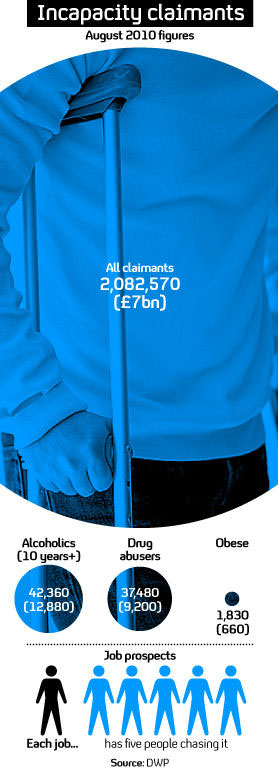Incapacity benefit paid to thousands for addictions
Incapacity benefit is paid to 81,000 people who are obese or have addictions according to the Government. One charity tells Channel 4 News the decision to release the data is “deeply unfortunate”.
Employment Minister Chris Grayling said the benefits system had trapped people in a “cycle of addiction and welfare dependency“.

The figures, released by the Department for Work and Pensions (DWP), are a snapshot of incapacity benefit (IB) claimants in August 2010.
Since February this year, no new IB claims have been accepted.
The figures show that 81,670 incapacity benefit claimants are not working because they are obese (1,830) or suffering from drug (37,480) or alcohol problems (42,360).
In total, there are 2.1 million IB claimants and the total yearly IB bill is £7bn.
Mr Grayling said: “It’s not fair on anyone for this situation to continue.
Existing claimants are now being reassessed to see whether they are fit to work straight away or need help first through the Employment and Support Allowance (ESA).
“Far from being the safety net it should be, the benefits system has trapped thousands of people in a cycle of addiction and welfare dependency with no prospect of getting back to work.
“We are putting an end to this, we won’t allow people to be left on benefits and forgotten about. That’s why we have already started reassessing everyone on incapacity benefit and will support people with addictions to help them back into work.”
‘Deeply unfortunate’
Charities have hit out at the Government’s decision to release the data.
Director of Policy at Disability Alliance, Neil Coyle, told Channel 4 News it was “deeply unfortunate”.
Read more: Incapacity benefit reassessment begins
He added: “No one is on incapacity benefit just because they have a drink problem. There tends to be a secondary health problem so an alcoholic may have liver damage.”
Neil Coyle called for “sensitivity” surrounding such data: “We have, in the past asked the Department for Work and Pensions to be careful with the release of data which might lead to stereotyping of claimants.”
He also raised questions about the way in which the DWP records its statistics: “Let’s take back problems for example. A back problem is ill-defined because the DWP doesn’t record it properly.
“A back problem could be caused by arthritis but because of the DWP’s poor recording methods it is misrepresented.”
-
Latest news
-
Taylor Swift’s new break-up album breaks records3m

-
NHS trust fined £200K for failings that led to death of two mental health patients3m

-
Sunak vows to end UK ‘sick note culture’ with benefit reform3m

-
‘Loose talk about using nuclear weapons is irresponsible and unacceptable’, says head of UN’s nuclear watchdog3m

-
‘There wasn’t an Israeli attack on Iran,’ says former adviser to Iran’s nuclear negotiations team7m

-




